https://twogrumpyoldmenonukraine.substack.com/p/blitz-interview-bjarne-kim-pedersen
BLITZ INTERVIEW: Bjarne Kim Pedersen - the poet who publishes a poem every day about the war in Ukraine, so far he is at 998...
For more than 20 years, the Danish poet has produced happenings, texts and poems for democracy and against Putin's brutality in Chechnya, Russia and Ukraine.
Where are you from? And where are you now? Doing what?
I
am Danish, born on the peninsula of Jutland (the bit sticking out sort
of on the top of Germany), and was raised on the island of Funen on a
small farm where my parents worked. My father was a part-time soldier in
the Home Guard as a sniper. Today, I live with my wife, Birgitte, in
the countryside in northern Funen. I met my wife in 1978 in Amnesty
International's prisoner group 58b. We have traveled independently for
extended periods, up to half a year, in the Balkans, Eastern Europe, and
Turkey. Today, I work full-time as a writer and publisher.
What kind of studies and work did you do previously? Where?
I worked on a farm.
Completed higher preparatory examination (HF) in Odense.
Served my military service in the Danish Armed Forces with the Southern Jutland Artillery Regiment.
Worked as a window cleaner.
Studied to become a social pedagogue. Worked with people with developmental disabilities at a sheltered workshop.
In
1993, I was responsible for clothing collection for war victims in
Bosnia. For several years, I led a ‘club house’ for older children and
youth.
I debuted with a poetry collection in 1982,
and from then until 2005, I worked full-time as a pedagogue and
part-time as a writer. In 2005, I left my job to become a part-time
pedagogue, teaching refugees and others at a production school. From
2005, I have been a full-time writer and publisher.
In 2001, I created an art performance about Putin’s first war in Chechnya, featuring texts, a replica of a Russian combat helicopter, helicopter sounds, and, most notably, images from Chechnya by Eddy van Wessel. A listener, Viktor Omkvist, a Ukrainian refugee, offered to translate it into Russian. In 2002, Aktindsigt was published in a Danish/Russian edition. I read from it several times at February 23rd memorial days in front of the Russian embassy in Copenhagen (photo below).
(Bjarne in 2003 with poems about Chechnya, photo: Thomas Billesbølle)
The book was given to Anna Politkovskaya when she visited Denmark in 2004 to receive a peace prize. I received a lovely greeting from her before she was shot by Putin's gunmen. The Ingush city writer Magomed Toriev was in Denmark and became my connection to the Euromaidan. He also said, 'Putin will never allow Ukraine to turn toward Europe.' We followed the developments together, and I wrote many small poems, a kind of Twitter poetry.
My wife Birgitte and I visited Ukraine for the first time in 2015, and some of our friends there suggested that my short poems should be published in a book. My Maidan Affair, in Danish/English/Ukrainian, was presented in Kyiv in May 2016.
(Bjarne at the Kyiv Poetry Festival 201, photo: Birgitte Bjerregaard)
In 2018, I created There Are Heroes,
texts critical of the hosting of the World Cup in Russia while Russia
was waging war against Ukraine. Interestingly, the book received
attention at the next World Cup in Qatar. However, Danish journalists
weren’t interested in hearing about Ukraine.
How has the war in Ukraine changed your life? Changed you personally?
I
was one of the few in the West who was not surprised. I have been
writing about Putin since he blew up Russian apartment buildings to
justify starting the Second Chechen War. Already a year before the
invasion, I said at a meeting that I believed a major Russian offensive
was coming
(Bjarne and other Danish Ukraine supporters at a demonstration in 2018)
When Russia invaded on February 24 2022, there was a lack of journalists in Denmark who knew much about Ukraine, and there still is. When I was interviewed on Denmark’s Radio (the Danish equivalent of the BBC), I mentioned that I had begun a War Poetry Diary in the same way I did during the Second Chechen War. The journalist asked how long I planned to continue. I replied, “Until the Russians are driven out of Ukraine!” He looked at me with astonishment, as if questioning whether I really believed Ukraine had a chance. Yes, I believed it. The Russians will never be able to win. They might occupy large parts of Ukraine and commit genocide, but they will never win Ukraine back.
Yes, I still have frequent contact with people in Ukraine, and I write a daily, current poem about Ukraine and the war. It takes a few hours each day. Alongside that, I have worked on initiatives like Cars for Ukraine, Tires for Ukraine, and Help Ukraine. On February 24, 2023, a paperback edition of Pages from My War Poetry Diary was published, and on February 24, 2024, More Pages from My War Poetry Diary was released.
My
daily poem is shared on my blog, on Facebook, on X (Twitter),
Instagram, and Threads. Some are shared by people who, collectively, may
have 250,000 followers. Many of the poems have been translated into
English, some into Ukrainian, and a few into German.
Sometimes
I think about how much more help I could have sent to Ukraine if I had
only spent the time on that instead. But words are important too.
Uninformed journalists or outright Russia supporters need to be nipped
at the heels with words.
And 10 police reports for
cyberattacks against me and 3 instances of punctured tires speak for
themselves. Putin's Russians are afraid of words.
(Bjarne’s poem for the fallen Ukrainian poet Maksym Kryvtsov, January 2024)
What have surprised you most about Ukrainians these past couple of years? Good or bad?
The
Ukrainian dignity and defiance, the ability to clean up and
re-establish everyday life—those were things I already knew Ukrainians
had. The fighting spirit, I knew well you guys possessed.
On the negative side, there are the wealthy young people who have fled Ukraine.
Now, writing from Denmark, I have been most surprised by how the atmosphere changed on February 24, 2022. Suddenly, the Danes stood behind Ukraine. Together with a local Ukrainian and a politician, we stood in the square of the nearest small town, collecting sleeping mats, sleeping bags, warm clothing, and medicine for Ukraine. It was incredibly positive, as were the Danish politicians.
Ukrainian refugees who came to Denmark were well received, and many quickly found jobs. Very positively, they could then use a Danish salary to help support back home in Ukraine. There was only a small group of Putin sympathizers who continued to speak negatively about Ukraine.
What are your future plans?
To
continue to write. Work against ‘war fatigue’ in the Danish media. Keep
informing people about what Ukraine is and who the Ukrainians are.
Support the Chechens who are fighting for Ukraine. Translate more and
more of my poems into English, convert them into image files, and share
them on Threads and other social media platforms. Khodorkovsky requested
one of my poems made in this way, which he then shared.
On a practical level, organize a support event in the local community hall for Cars for Ukraine. Translate Ukrainian poems into Danish—I have translated some of Vira Savchenko's works
(Bjarne with Vira Savchenko, 2016, Kyiv)
How do you see the war ending and Ukraine returning to a ’normal life’?
I'm
not sure right now about Trump and Musk. But the North Koreans are also
a sign of Russian war fatigue. I believe there will be an uprising
against Putin at some point, especially if the young, well-educated
urban population is forced into the war.
The solution is not a ceasefire where Ukraine has to cede land. And it should be the Russian oligarchs' money in the West that is used to rebuild Ukraine. In a just peace settlement, I envision a new power center extending from the Nordic countries with the Baltics, down through Poland to Ukraine. In a just peace, Russian war criminals must be brought before a court of law.
When peace comes, we must be ready to help all Ukrainians who bear physical and psychological scars from the war, such as PTSD. On our last two visits to Kyiv, my wife Birgitte, who is a psychotherapist, has been teaching new methods for coping with inner voices. She has taught at Pavlov Hospital and to psychology students. She found that Ukrainian psychiatrists were more open to new approaches than Danish psychiatrists.
Tell us one thing you don’t think people abroad know about Ukraine – but they really should?
When
my wife and I have walked across Kyiv in the middle of the night after
spending time with friends, I have felt much safer than when doing the
same in Copenhagen or, for that matter, in H.C. Andersen's Odense.
When
we first traveled to Kyiv in 2015, a Russian living here said to us,
'How dare you go to Kyiv?' I reassured her, 'The front is 800 km away,
so it’s not dangerous.' 'But all the fascists rampaging in Kyiv!'
Honestly, I encounter more extreme right-wing individuals in Denmark than in Ukraine. Today, I often emphasize that Ukraine now has a Jewish president and a Muslim defense minister.
To commemorate ONE THOUSAND DAYS OF WAR, on Tuesday November 19 2024 we will publish Bjarne’s 1,000 poem about the war.
Bjarne’s poems can be read at:
https://bjarnekimpedersen.blogspot.com/

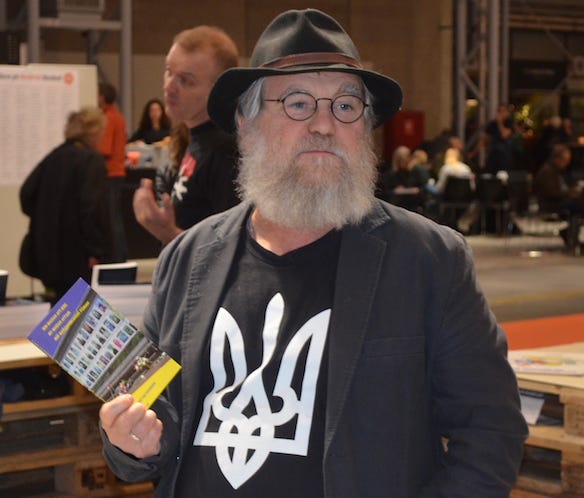
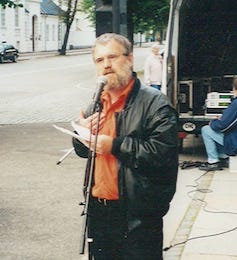
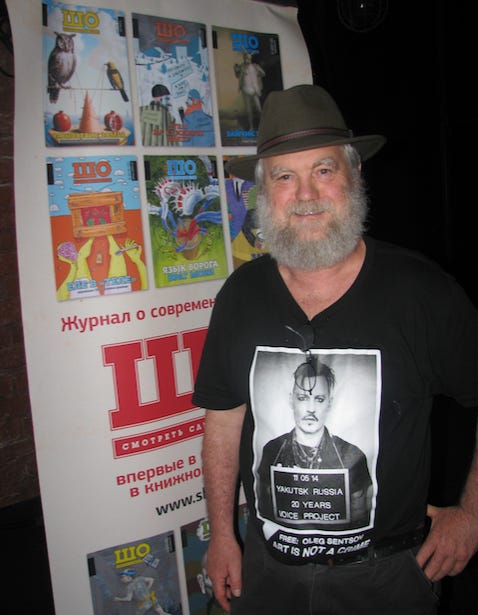
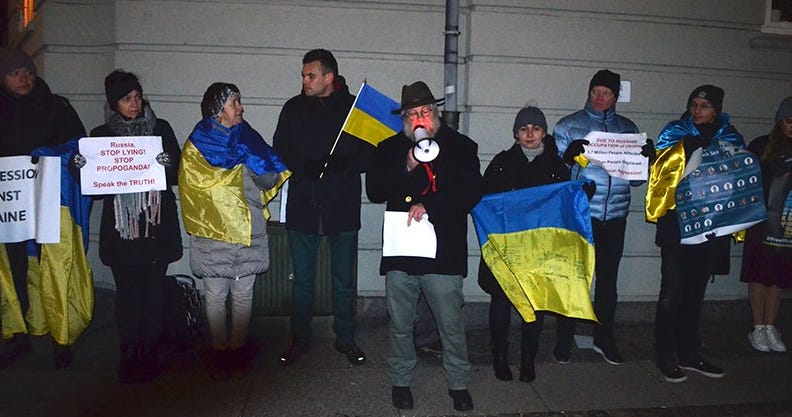
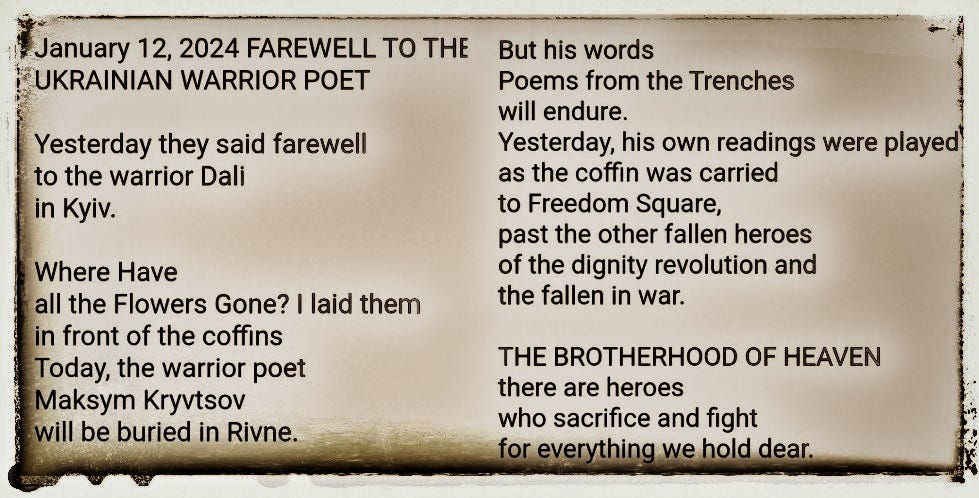
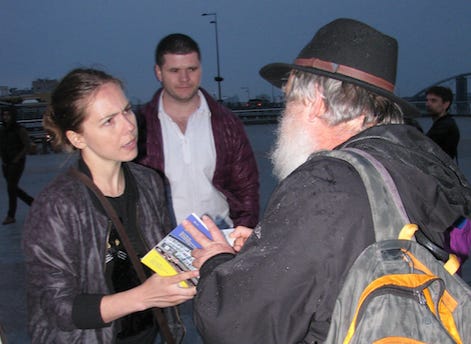


Ingen kommentarer:
Send en kommentar